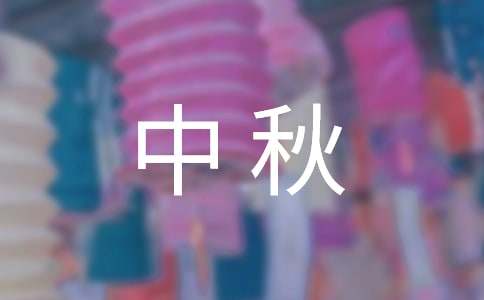- 相关推荐
2017年中秋快乐的英文(附中秋英文作文)
八月十五的月亮比其他几个月的满月更圆,更明亮,所以又叫做“月夕”,“八月节”。以下是PINCAI小编整理的2017年中秋快乐的英文(附中秋英文作文),欢迎阅读参考!

2017年中秋快乐的英文(附中秋英文作文)
中秋快乐的英文
Happy Mid-Autumn Festival
短语
猪你中秋快乐 Pig you happy Mid-Autumn Festival ; Happy Mid-Autumn Festival pig you ; Pig you happy autumn
预祝大家中秋快乐 I wish everyone happy autumn
预祝中秋快乐 Happy Mid-Autumn Festival
亲中秋快乐 Happy Mid-Autumn Festival
丈夫中秋快乐 Husband happy Mid-Autumn festival
我们中秋快乐 We Happy Mid-Autumn Festival
国庆中秋快乐 Mid-Autumn Day Happy ; merry Mid-autumn Day
爸妈中秋快乐 Dad happy Mid-Autumn Festival
大家中秋快乐 I wait ; Everyone happy autumn ; everyone happy Mid-Autumn Festival ; We Happy
拓展阅读
中秋英文作文一
The Mid-Autumn is a very important Chinese festival. It falls on the 15th day of August. A few days before the festival, everyone in the family will help to make the house clean and beautiful. Lanterns will be hung in front of the house.
On the evening there will be a big family dinner. People who work far away from their homes will try to come back for the union. After dinner, people will light the lanterns which are usually red and round. Children will play with their own toy lanterns happily.
At night the moon is usually round and bright. People can enjoy the moon while eating moon-cakes which are the special food for this festival. They can look back on the past and look forward to the future together.
中秋英文作文二
I think Mid-Autumn Day is an old traditional festival in China. Everybody likes it because it's a family get-together. You see it is called"Mid-Autumn Day", so it often comes in September or October. It is on the 15th of the 8th of the lunar month. Now, let's say something about this interesting festival.
Firstly, I'd like to say something about the moon. I like it very much because I want to be an astronaut in the future. That day the moon is round, big, just like a beautiful plate hanging on the blue cloth. When I see the moon, I will remember the ancient myths——the godess Chang Er and her little rabbit are playing under the tree which Wu Gang grows. I will also think about Armstrong's first moonwalk. I will also miss the friends in Tai-wan island, in Macao and Chinese people who are abroad. I know they are missing us very much, too.
Secondly, I'11 say something about the tradition on Mid-Autumn Day. Look!There's a big tree in a garden of a Chinese fami-ly. All the family members are sitting around a big table under the tree in the open air. They are eating the mooncakes and admiring the full moon in the sky. That is a family reunion dinner. The mooncakes and the moon represent the love from a family. I think this is one of the most valuable things in the world.
Thirdly,it is a very good opportunity to make three wishes on Mid-Autumn Day. My wishes are: the first, I, an astronaut in the future, would like to go to the moon one day, and stay with the sky and stars; the second, I hope every person in the world will stay with family, share love from the family forever; the third, I hope everybody's dream will come true.
That is the Mid-Autumn Day in my mind. I will always re-member: East or West, home is best.
中秋英文作文三
Mid-Autumn Festival (also known as the Moon Festival), the third major festival of the Chinese calendar, is celebrated on the 15th day of the 8th month, as the moon is supposed to be at its maximum brightness for the entire year.
The moon definitely spins countless legends throughout the ages. Of course, the most famous legend is the one surrounding the "lady living in the moon" that dates back to ancient times, to a day when ten suns appeared at once in the sky. The Emperor ordered a famous archer to shoot down the nine extra suns. Once the task was accomplished, Goddess of Western Heaven rewarded the archer with a pill that would make him immortal. However, his wife found the pill, took it, and was banished to the moon as a result. Legend says that her beauty is greatest on the day of the festival.
Another legend depicts a possible role that the festival played in Chinese history. Overrun by the Mongols in the thirteenth century, the Chinese threw off their oppressors in 1368 AD. It is said that mooncakes - which the Mongols did not eat - were the perfect vehicle for hiding and passing along plans for the rebellion. Families were instructed not to eat the mooncakes until the day of the festival, which is when the rebellion took place.
The most lunatic mortal in Chinese history could have been the great poet Li Bai (701-762 AD), who once invited the moon to have a drink with him and his shadow to form a band of three. Li finally drowned in a lake in an effort to catch the moon when he was drunk one night.
The festive night can be one of the most charming and picturesque nights and the full moon is an auspicious symbol of abundance, harmony and luck. For thousands of years, the Chinese people have related the vicissitudes of life to changes of the moon as it waxes and wanes; joy and sorrow, parting and reunion. In Chinese culture, the family represents an important circle of relations that cannot be broken. Because the full moon is round and symbolizes reunion, the festival is also known as the festival of reunion. All family members try to get together on this special day. It is a happy occasion where people feast on scrumptious mooncakes. Some Chinese families today still stay up late to observe the occasion eating mooncakes, sipping tea and gazing at the beautiful moon. It is regarded the perfect moment if someone catches the moon's reflection in the center of his or her teacup. Those who can not return home watch the bright moonlight and feel deep longing for their loved ones.